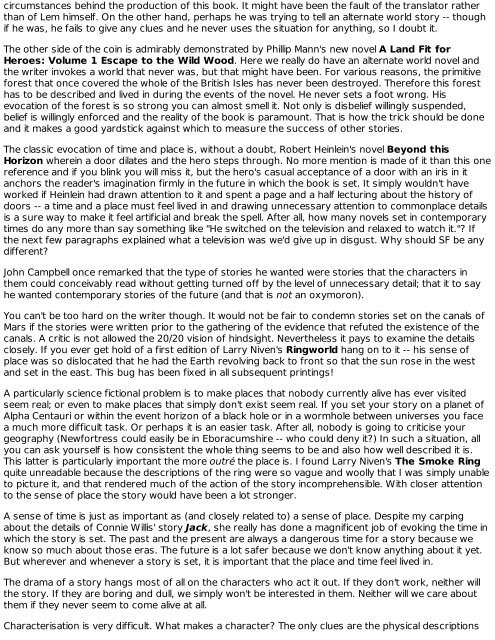Triffids Beard 2 - The Bearded Triffid
Triffids Beard 2 - The Bearded Triffid
Triffids Beard 2 - The Bearded Triffid
You also want an ePaper? Increase the reach of your titles
YUMPU automatically turns print PDFs into web optimized ePapers that Google loves.
circumstances behind the production of this book. It might have been the fault of the translator rather<br />
than of Lem himself. On the other hand, perhaps he was trying to tell an alternate world story -- though<br />
if he was, he fails to give any clues and he never uses the situation for anything, so I doubt it.<br />
<strong>The</strong> other side of the coin is admirably demonstrated by Phillip Mann's new novel A Land Fit for<br />
Heroes: Volume 1 Escape to the Wild Wood. Here we really do have an alternate world novel and<br />
the writer invokes a world that never was, but that might have been. For various reasons, the primitive<br />
forest that once covered the whole of the British Isles has never been destroyed. <strong>The</strong>refore this forest<br />
has to be described and lived in during the events of the novel. He never sets a foot wrong. His<br />
evocation of the forest is so strong you can almost smell it. Not only is disbelief willingly suspended,<br />
belief is willingly enforced and the reality of the book is paramount. That is how the trick should be done<br />
and it makes a good yardstick against which to measure the success of other stories.<br />
<strong>The</strong> classic evocation of time and place is, without a doubt, Robert Heinlein's novel Beyond this<br />
Horizon wherein a door dilates and the hero steps through. No more mention is made of it than this one<br />
reference and if you blink you will miss it, but the hero's casual acceptance of a door with an iris in it<br />
anchors the reader's imagination firmly in the future in which the book is set. It simply wouldn't have<br />
worked if Heinlein had drawn attention to it and spent a page and a half lecturing about the history of<br />
doors -- a time and a place must feel lived in and drawing unnecessary attention to commonplace details<br />
is a sure way to make it feel artificial and break the spell. After all, how many novels set in contemporary<br />
times do any more than say something like "He switched on the television and relaxed to watch it."? If<br />
the next few paragraphs explained what a television was we'd give up in disgust. Why should SF be any<br />
different?<br />
John Campbell once remarked that the type of stories he wanted were stories that the characters in<br />
them could conceivably read without getting turned off by the level of unnecessary detail; that it to say<br />
he wanted contemporary stories of the future (and that is not an oxymoron).<br />
You can't be too hard on the writer though. It would not be fair to condemn stories set on the canals of<br />
Mars if the stories were written prior to the gathering of the evidence that refuted the existence of the<br />
canals. A critic is not allowed the 20/20 vision of hindsight. Nevertheless it pays to examine the details<br />
closely. If you ever get hold of a first edition of Larry Niven's Ringworld hang on to it -- his sense of<br />
place was so dislocated that he had the Earth revolving back to front so that the sun rose in the west<br />
and set in the east. This bug has been fixed in all subsequent printings!<br />
A particularly science fictional problem is to make places that nobody currently alive has ever visited<br />
seem real; or even to make places that simply don't exist seem real. If you set your story on a planet of<br />
Alpha Centauri or within the event horizon of a black hole or in a wormhole between universes you face<br />
a much more difficult task. Or perhaps it is an easier task. After all, nobody is going to criticise your<br />
geography (Newfortress could easily be in Eboracumshire -- who could deny it?) In such a situation, all<br />
you can ask yourself is how consistent the whole thing seems to be and also how well described it is.<br />
This latter is particularly important the more outré the place is. I found Larry Niven's <strong>The</strong> Smoke Ring<br />
quite unreadable because the descriptions of the ring were so vague and woolly that I was simply unable<br />
to picture it, and that rendered much of the action of the story incomprehensible. With closer attention<br />
to the sense of place the story would have been a lot stronger.<br />
A sense of time is just as important as (and closely related to) a sense of place. Despite my carping<br />
about the details of Connie Willis' story Jack, she really has done a magnificent job of evoking the time in<br />
which the story is set. <strong>The</strong> past and the present are always a dangerous time for a story because we<br />
know so much about those eras. <strong>The</strong> future is a lot safer because we don't know anything about it yet.<br />
But wherever and whenever a story is set, it is important that the place and time feel lived in.<br />
<strong>The</strong> drama of a story hangs most of all on the characters who act it out. If they don't work, neither will<br />
the story. If they are boring and dull, we simply won't be interested in them. Neither will we care about<br />
them if they never seem to come alive at all.<br />
Characterisation is very difficult. What makes a character? <strong>The</strong> only clues are the physical descriptions


